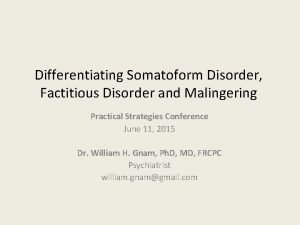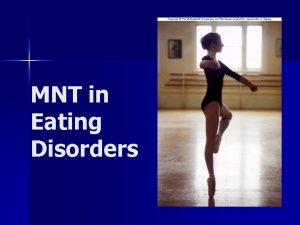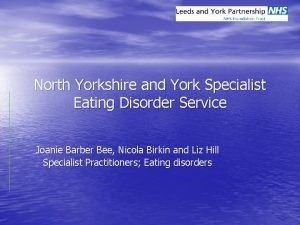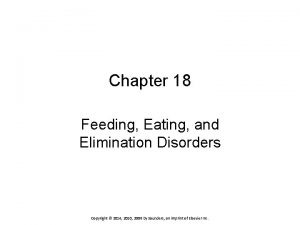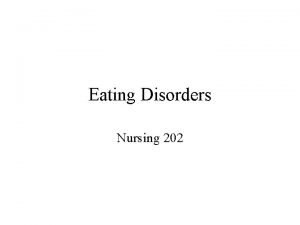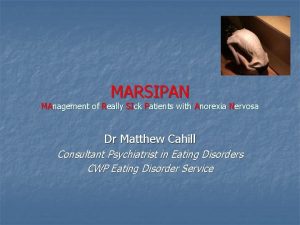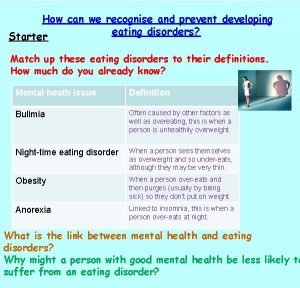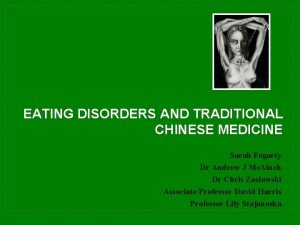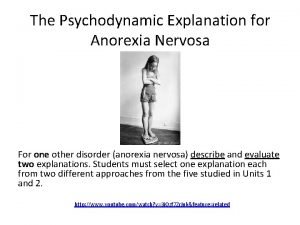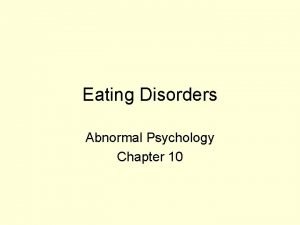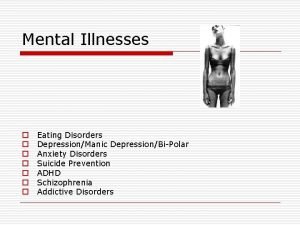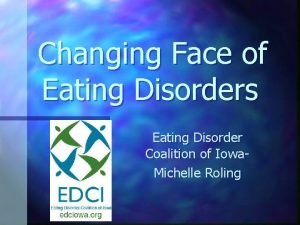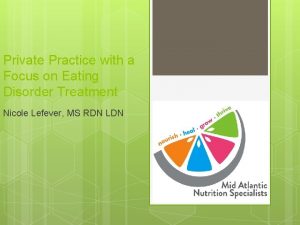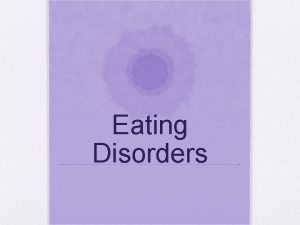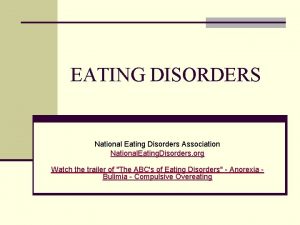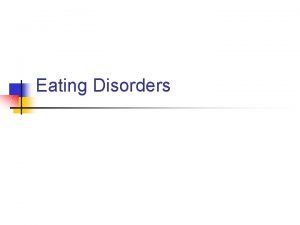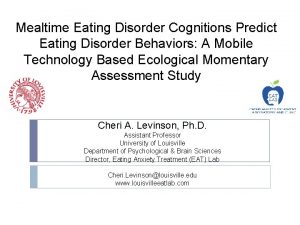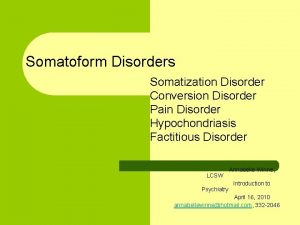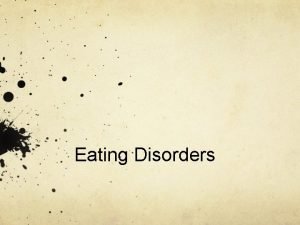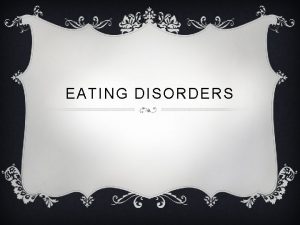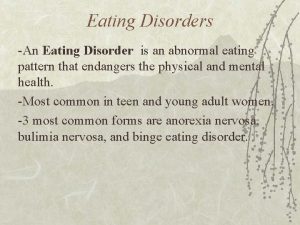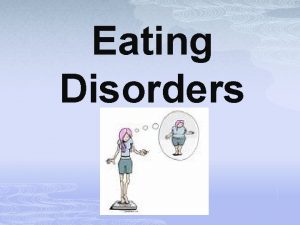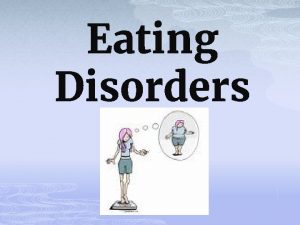Eating Disorders What Is An Eating Disorder Generally















- Slides: 15

Eating Disorders

What Is An Eating Disorder? • Generally, an Eating Disorder any of a range of psychological disorders characterized by abnormal eating habits and behaviors. • An eating disorder is when a person experiences severe disturbances in eating behavior, such as extreme reduction of food intake or overeating, or feelings of intense distress or concern about body weight or shape. • People with eating disorders are usually SECRETIVE about their eating, purging or lack of eating. What might you consider an Abnormal eating behavior?

Anorexia Nervosa • Anorexia is the loss of appetite for food as a medical condition. As an emotional disorder, is it characterized by an obsessive want to lose weight by refusing to eat. • A very complex eating disorder, Anorexia has 3 key characteristics • Refusal to maintain a normal body weight • Intense fear of gaining weight • Body dysmorphia (distorted body image) Do you think that someone with Anorexis thinks that They still need to lose weight? Do they really see the fat?

Sings and Symptoms • • Dramatic weight loss. Denial of being underweight. Obsession with calories, fat, grams, carbs, etc. Often making excuses as to why the person is not eating. What kind of excuses could someone make for not eating or avoiding situations where eating is involved?

Causes • Some research suggests a genetic predisposition to Anorexia. • Brain chemistry plays a significant role as well. • An individual may experience decreased self-esteem or self-control because of pre-disposing factors and use dieting or weight loss to gain a sense of control. How does would someone with Anorexia feel a sense of control in their life?

Physical and Mental Effects Mood Swings Tiredness/Fatigu e Small Black Hairs over Body and Face Poor Memory Tooth and Gum Decay How are these symptoms related to a lack of nutrition? Brittle, Breaking Dizziness, Headaches and Fainting Yellowing Skin

Pro. Anna • There a number of internet sights that promote Annorexia • They are a place where people can share tips on not eating. • A number of places have tried to ban them and make them illegal. • What do you think?

Warning Signs • If you suspect that your friend may be developing Anorexia, what kind of clues could you look for? Brainstorm a list.

Bulimia Nervosa • An overeating disorder followed by a vicious purging cycle. A compulsion to overeat followed by intense feelings of guilt and depression thus beginning the cycle of forced sickness, over exercising, or fasting. • People with Bulimia tend to be of average weight. Do you ever feel guilty after eating And have the desire to “purge”?

Causes • Genes, hormones and brain chemicals similar to those found in Anorexia sufferers contribute. • Like Anorexia, Bulimia stems from an obsession to lose weight. • Unlike Anorexia, Bulimics are more focused on selfimage than control. Why are people with Bulimia of An average weight and not thin?

Physical and Mental Effects • • • Inability to sleep Infertility Internal bleeding Swelling and scarring in the throat and mouth Swelling and scarring on fingers and hands Depression Anxiety Heart Attacks Ultimately, death.

The Cycle Strict Diet and Exercise Feelings of Depression, Guilt, Disgust and Self Hatred Binging over Eating mass amounts In a short period of time Purging excessive exercise, forced sickness and fasting. How could you break the cycle? How would you treat someone with Bulimia?

Warning Signs • If you suspect that your friend may be developing Anorexia, what kind of clues could you look for? Brainstorm a list.

Statistics • – One in 100 American women suffer from anorexia. Three in 100 women suffer from bulimia. That makes 3/100. • – Women are much more likely than males to develop an eating disorder, but men can have eating disorders (and it is increasing). • – Anorexia nervosa has the highest early death rate of any mental illness, up to 20 percent. • – Most people with eating disorders never receive mental health care. • – Almost 50% of people with eating disorders meet the criteria for depression. • - As many as 10% of college women suffer from a clinical or nearly clinical eating disorder, including 5. 1% who suffer from bulimia nervosa Which fact do you find surprising and/or interesting?

Helping your Friends • What warning signs could you look for the following disorders? • Cutting • Psychosis • Mania • Anorexia • Bulimia • What should you do if you see some of the warning signs?
 Dsm 5 munchausen by proxy
Dsm 5 munchausen by proxy Brainpop eating disorders
Brainpop eating disorders How to be anorexic
How to be anorexic York eating disorders service
York eating disorders service An extreme harmful eating behavior
An extreme harmful eating behavior Chapter 18 eating and feeding disorders
Chapter 18 eating and feeding disorders Eating disorder nursing diagnosis
Eating disorder nursing diagnosis Eating disorders in uae
Eating disorders in uae Marsipan anorexia
Marsipan anorexia How to spot eating disorders
How to spot eating disorders Sarah fogarty
Sarah fogarty Anorexia psychodynamic explanation
Anorexia psychodynamic explanation Kate moss eating disorder
Kate moss eating disorder Kate bosworth anorexia
Kate bosworth anorexia Eating disorder coalition of iowa
Eating disorder coalition of iowa Fear food list
Fear food list
